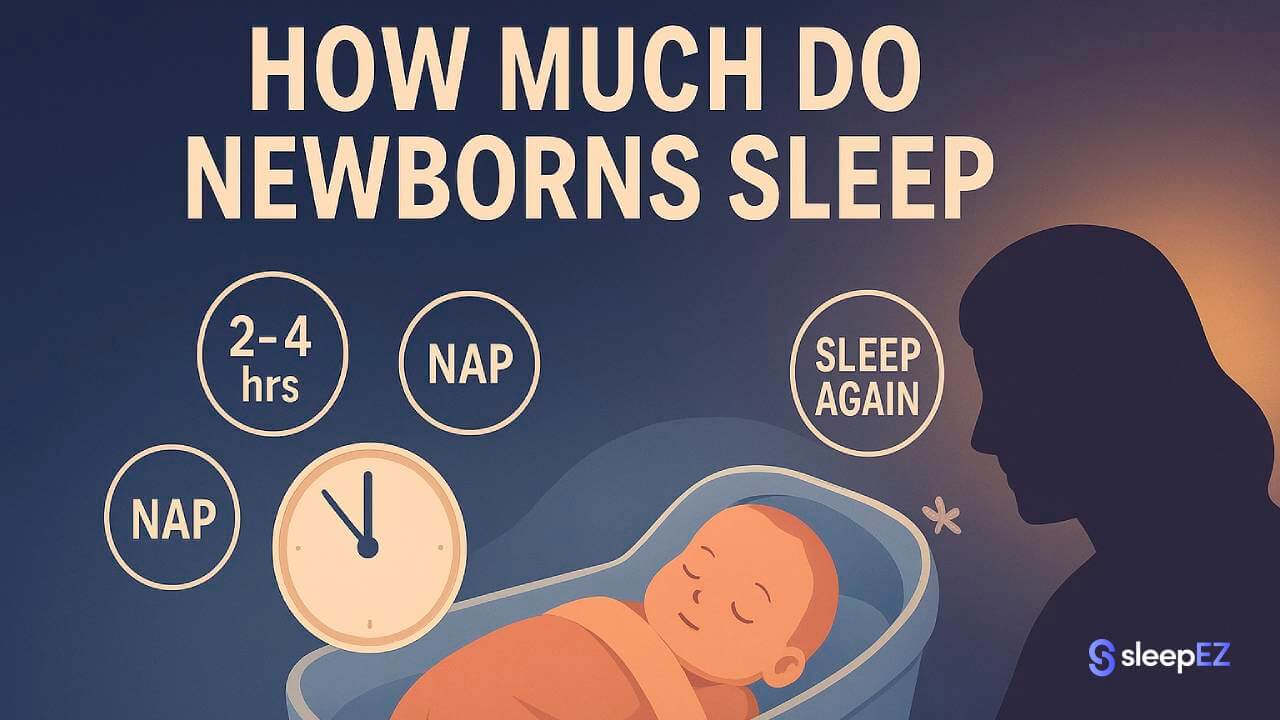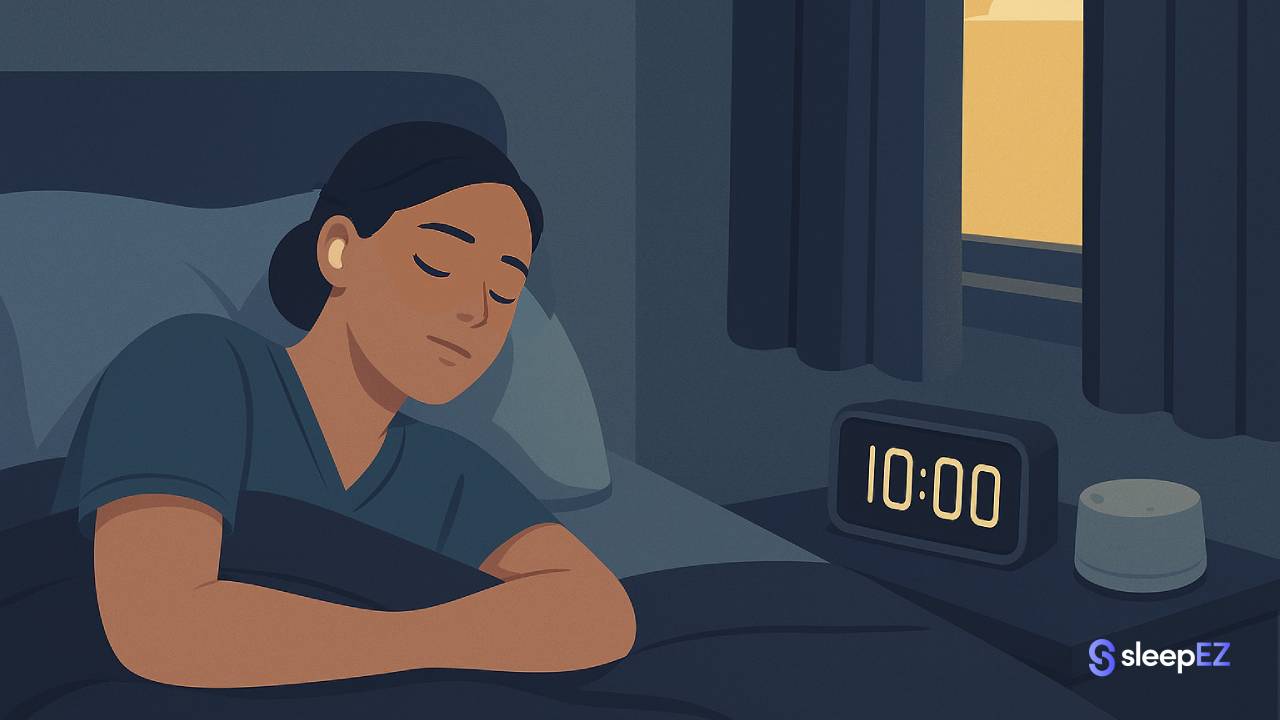If you're wondering whether your baby's sleep is normal, you're not alone. Newborn sleep is one of the most searched topics for new parents, and for good reason. You're tired. You're worried. You want to know if what you're experiencing is okay.
This guide walks you through the official guidelines from pediatric experts, explains why your baby sleeps the way they do, and offers some gentle, safe tips.
How Many Hours Should a Newborn Sleep?
According to the American Academy of Pediatrics (AAP), newborns (ages 0-3 months) typically sleep for 14–17 hours in a 24-hour period.
Here's what you need to understand: This 14-17 hours is the total time. It is not slept all at once. It is broken up into many short naps, or "sleep periods," throughout the day and night. Your baby might sleep for 2-4 hours at a time, wake to eat, and then fall back asleep. This pattern repeats around the clock.
A "Normal" Newborn Sleep Pattern
Your baby's sleep feels chaotic because it is. But this isn't random. Your newborn's brain and body are hardwired to sleep this way. Understanding the reasons behind the wake-ups and short naps can help you feel less frustrated and more prepared for what's happening.
They Need to Eat
Newborns have tiny stomachs and need to eat every 2-4 hours, even at night. This is a normal survival instinct. Your pediatrician may advise you to wake your baby for feeds if needed, especially in the first few weeks.
They Don't Have an "Internal Clock"
Your baby hasn't developed their circadian rhythm yet. They don't know the difference between day and night. This is often called "day/night confusion" and is completely normal. Their brain is still learning when it's time to be awake and when it's time to sleep.
They Have Short Sleep Cycles
Babies spend more time in "active sleep" (REM) than adults. This is why you'll see them twitch, smile, or grunt in their sleep. It also means they can wake up more easily than you do. A small noise or a full diaper can pull them out of sleep.
5 Gentle Tips to Encourage Healthy Sleep Habits
These tips create a sleep-friendly environment. They won't force your baby to sleep, but they can help.
1. Gently Teach Day vs. Night
During the day, keep the house bright and filled with normal sounds. At night, keep the lights dim and interactions quiet during feeds. No talking, no playing, just calm feeding and changing. This helps your baby's brain start to learn the difference.
2. Watch for Their Sleepy Cues
Look for signs like yawning, rubbing eyes, or fussiness. Try to put your baby down when they are "drowsy but awake." This helps them learn to fall asleep on their own, though it won't always work in the newborn stage.
3. Try Swaddling (Safely)
A swaddle can mimic the womb and calm their startle reflex. Many babies sleep better when swaddled because it keeps their arms from flailing and waking them up.
Safety note: The AAP says to stop swaddling as soon as your baby shows any signs of trying to roll over. Once they can roll, swaddling becomes dangerous.
4. Start a Simple Routine
You don't need a strict schedule, but a simple 3-step routine can help. Try a bath, a feed, and a lullaby. Or a diaper change, a feed, and some rocking. The routine signals to your baby that it's time to wind down. Keep it short and consistent.
5. Create a Soothing, Safe Environment
This is where safety and comfort meet.
How to Create a Safe and Soothing Sleep Environment
First and foremost, the AAP's safe sleep guidelines are the most important rule. Always place your baby Alone, on their Back, and in a Crib (or bassinet) with a firm, flat mattress. There should be no blankets, pillows, bumpers, or soft toys in their sleep space. These items increase the risk of suffocation.
Once the space is safe, you can make it soothing. The womb was not a silent place. Your baby heard your heartbeat, your blood flow, and muffled voices for months.
Many parents find that a white noise machine for a baby helps mimic the "shushing" sound of the womb. It doesn't make a baby sleep, but it can help mask sudden household noises like a door closing or a dog barking that might startle them awake.
You can consider a device like the Hush Light and Sound Machine, which provides a constant, soothing sound to help create a more consistent sleep environment.
When to Call Your Pediatrician
You are the expert on your baby. Your pediatrician is your partner. Always trust your gut and call them if you are worried.
Call your pediatrician if:
- Your baby is very hard to wake up for feeds
- Your baby seems to be sleeping far less than 14 hours and is fussy or crying all the time
- You have any concerns about their feeding, weight gain, or breathing
- Something just feels off to you
Remember: No question is a "dumb question" for your pediatrician. They would rather hear from you than have you worry alone.
Conclusion: This Phase Is Short
The newborn sleep phase can feel like a marathon, but it is a short, temporary season. Your baby's sleep patterns will change. Around 3-4 months, many babies start to sleep for longer stretches. Around 6 months, their circadian rhythm starts to mature.
Be patient with them, and just as important, be kind to yourself. You are doing a great job.




Leave a comment
This site is protected by hCaptcha and the hCaptcha Privacy Policy and Terms of Service apply.